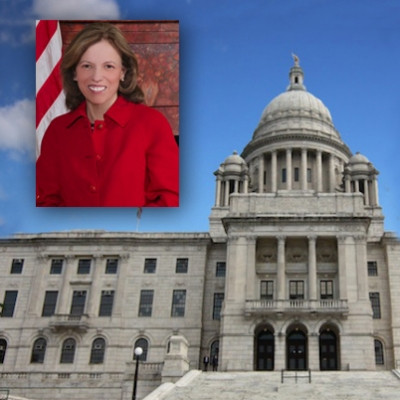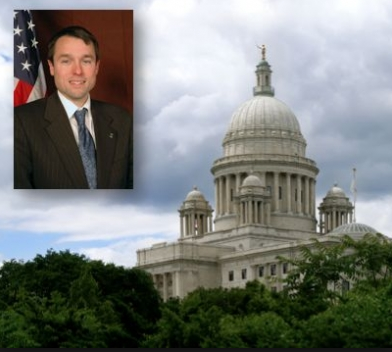Battle Over “RhodeMap RI” Economic Plan Heats Up
Wednesday, November 12, 2014
A battle is heating up between supporters of a new economic planning initiative "RhodeMap RI" -- and opponents who are calling on the 35-member RhodeMap RI consortium to postpone adoption of its controversial plan until a more rigorous public debate has ensued.
According to its website, RhodeMap RI is a "coordinated and forward-looking effort by the state to make Rhode Island a better place to live and work by mobilizing state and community assets in a whole new way. Through RhodeMap RI, the State seeks to strengthen our economy, meet current and future housing needs, and plan for future growth through the development of an integrated plan that will also include strategies for transportation, land use and environmental protection."
"What we see is a coordinated national-state-local scheme where federal agencies are poised to seize unprecedented levels of control over local land-use and housing issues," commented Mike Stenhouse, CEO for the Center for Freedom and Prosperity. "Property owners and local officials are about to lose sovereignty over their own affairs to the federal government."
GET THE LATEST BREAKING NEWS HERE -- SIGN UP FOR GOLOCAL FREE DAILY EBLASTThe consortium is meeting Wednesday afternoon to vote on the adoption of the plan.
Opposing Views
RhodeMap RI is funded with a Sustainable Communities Initiative Grant. The grant is one of several offered through the Federal Partnership for Sustainable Communities, a collaboration of the U.S. Department of Housing and Urban Development (HUD), the U.S. Environmental Protection Agency, and the U.S. Department of Transportation.
"The plan contains six goals and many strategies. It will be up to the governor and the legislature to determine which of these move forward, especially if any require legislation. In other ways, once adopted, the plan serves as guidance to local communities doing their comprehensive plans, and that is an ongoing process," said Kevin Flynn, the state's Division of Planning Associate Director .
Rhode Map RI's website states that the goals of the grant program "supports metropolitan and multi-jurisdictional planning efforts that integrate housing, land use, economic and workforce development, transportation, and infrastructure investments in a manner that empowers jurisdictions to consider the interdependent challenges of: (1) economic competitiveness and revitalization; (2) social equity, inclusion, and access to opportunity; (3) energy use and climate change; and (4) public health and environmental impact."
In late October, the Center joined with other plan opponents from across the state to speak out against the proposed RhodeMapRI plan at two public comment hearings. The Center also submitted a written response letter to the administration's Division of Planning. According to the Center, the seven page letter lists "multiple economic, governance, and philosophical concerns and discusses the negative consequences of ceding the sovereignty of state and local governments to un-elected bureaucrats from a federal agency. The Center recommends Rhode Island should not become the first state to adopt such measures, especially given the lack of public debate on the topic."
Next Steps
"Our goal at this point is to raise awareness and to initiate a rigorous public debate on this highly controversial, critically important, and personally emotional issue, before any of the plan's components are implemented," said Stenhouse.
"That the lame-duck Chafee administration is rushing to push this through before they leave office, and the fact that "the" economic development plan for the state received zero attention from gubernatorial candidates and the media, should raise alarms about why this is being snuck through under the radar," continued Stenhouse.
"As we understand it, the plan will be adopted by the consortium on Wednesday then made part of the larger state guide plan - perhaps by executive order. How the plan subsequently gets implemented -- what HUD strings, state regulations, local ordinances, state laws -- is unknown to us," said Stenhouse.
Flynn said he thought the opposing arguments were "misguided."
"While I have not sat down to discuss, the public hearing process was open to all, and many expressed opinions, both pro and con, in verbal testimony and in writing. In addition, the planning process included dozens of meetings, workshops, focus groups, individual interviews and the engagement of a broad sector of private sector business representatives convened through the Providence Foundation and Commerce RI," said Flynn. "Over 1000 individuals have participated in the development of this plan, and the draft does its best to summarize that input from a broad representation of RI's population."
Related Slideshow: 7 Strategies for Rhode Island Economic Development in 2014
What will it take to move the Rhode Island economy forward in 2014? GoLocal talked with elected officials, candidates, and leaders for their economic development plans in the coming year.
Below are key elements of the economic priorities for Governor Lincoln Chafee, Speaker of the House Gordon Fox, Senate President M. Teresa Paiva-Weed, House Minority Leader Brian Newberry, gubernatorial hopefuls General Treasurer Gina Raimondo and Ken Block, and RI Center for Freedom and Prosperity's Mike Stenhouse.

















